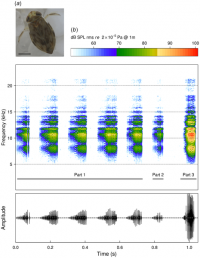June 20, 2011 report
Tiny water boatman is a champion singer

(PhysOrg.com) -- Researchers studying the lesser water boatman have discovered that adjusting for size, M. scholtzi, a tiny freshwater bug, is the apparent world champion at producing the loudest noise. At only 2.3mm (about the width of a dry grain of rice) the tiny water boatman is able to "sing" underwater in a river and still be heard quite easily on shore. In their paper published in PLoS ONE, the team describes how in their lab, the tiny bugs managed to produce songs that averaged 79 decibels, but at their noisiest produced sounds as loud as 105 decibels, or something on the order of a snowmobile driving by.
The study, led by Jérôme Sueur of the Natural History Museum in Paris noted that little research has been done on the songs and other various noises created by freshwater insects, as compared to the huge volumes on large animals such as whales and elephants. To help remedy that, he and his team collected some specimens from both a river and a small pond near Paris, then set them up in a tank with underwater microphones, then recorded the tiny bugs in action. In all they managed to record the songs of 13 males (the females don’t sing) and found they “chirp” on average at three different levels; quiet, intermediate, and loud. They also discovered that the boatman chirps both in solo fashion and as part of a chorus with its fellow competitors for the attention of nearby females. It’s still not known why exactly the boatman feels the need to chirp so loudly, whether it’s to be heard above the noise of other males in the vicinity, or to overcome the din created by other animals or insects that inhabit the same waters, or simply because it can.
Prior to this study, research had already shown that the boatman makes his chirp by rubbing his penis over the ridges that cover his belly; though it was and is still unclear just exactly how he reaches such high levels of noise doing so. One theory suggests that because the boatman traps air bubbles on his body to aid in breathing underwater, a sort of echo chamber is created, which reverberates, building up noise. Because of its small size, it’s been difficult to study the boatman up close and in action, though the team from Paris vows to keep looking, hoping to settle the matter once and for all.
More information: Sueur J, Mackie D, Windmill JFC (2011) So Small, So Loud: Extremely High Sound Pressure Level from a Pygmy Aquatic Insect (Corixidae, Micronectinae). PLoS ONE 6(6): e21089. doi:10.1371/journal.pone.0021089
Abstract
To communicate at long range, animals have to produce intense but intelligible signals. This task might be difficult to achieve due to mechanical constraints, in particular relating to body size. Whilst the acoustic behaviour of large marine and terrestrial animals has been thoroughly studied, very little is known about the sound produced by small arthropods living in freshwater habitats. Here we analyse for the first time the calling song produced by the male of a small insect, the water boatman Micronecta scholtzi. The song is made of three distinct parts differing in their temporal and amplitude parameters, but not in their frequency content. Sound is produced at 78.9 (63.6–82.2) SPL rms re 2.10−5 Pa with a peak at 99.2 (85.7–104.6) SPL re 2.10−5 Pa estimated at a distance of one metre. This energy output is significant considering the small size of the insect. When scaled to body length and compared to 227 other acoustic species, the acoustic energy produced by M. scholtzi appears as an extreme value, outperforming marine and terrestrial mammal vocalisations. Such an extreme display may be interpreted as an exaggerated secondary sexual trait resulting from a runaway sexual selection without predation pressure.
via Discover Blog
© 2010 PhysOrg.com











.jpg)





